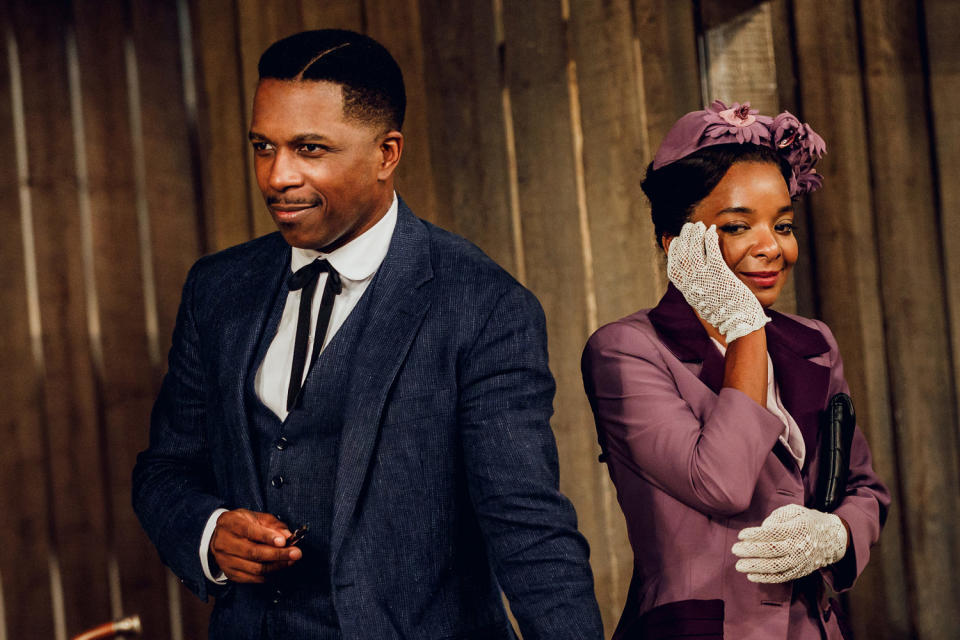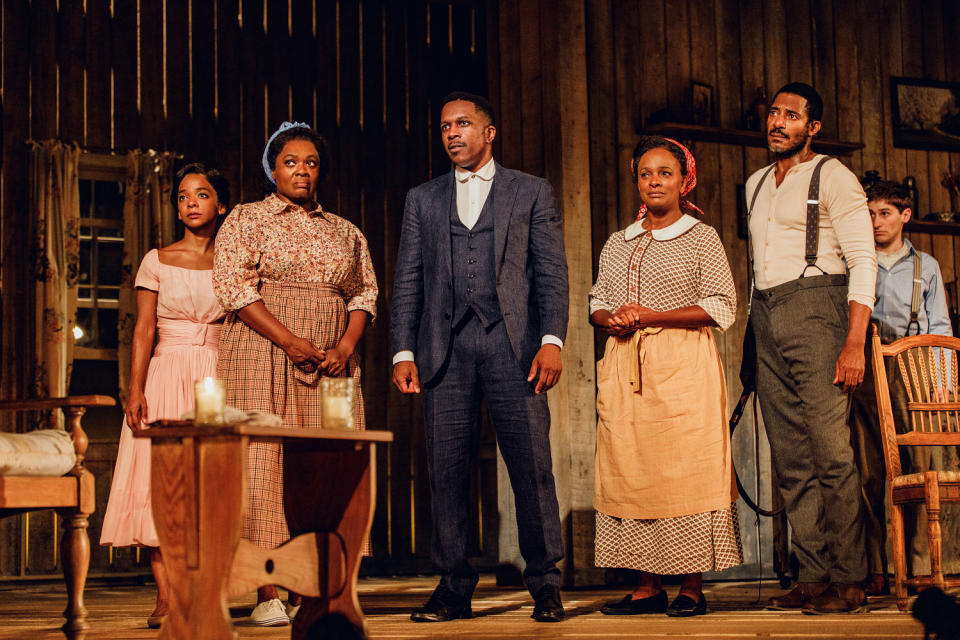Leslie Odom Jr. wants us to hear the melodic words of ‘Purlie Victorious’
- Oops!Something went wrong.Please try again later.
- Oops!Something went wrong.Please try again later.
“Purlie Victorious” may not be a musical, but to its lead star, Leslie Odom Jr., the words of this six-decade-old play are melodic.
Odom, best known on Broadway for his Tony-winning performance as Aaron Burr in “Hamilton,” said the musicality of “Purlie Victorious: A Romp Through the Non-Confederate Cotton Patch” is something he and his fellow actors continue to uncover every night at New York City’s Music Box Theater.
“There is music here,” Odom, 42, said in a phone interview. “It’s a great joy when it feels like we’ve hit our stride and we’re really playing the same song.”
When the show first opened on Broadway in 1961, it starred Ossie Davis, who also penned the text, and his wife, the acting legend Ruby Dee. The revival starring Odom is the first time the show returns to a New York stage since its debut.

Despite the time that has passed between Odom’s first encountering the play as a high school actor and now acting and producing it on Broadway, the text continues to surprise him with its nuances.
“I’ve read this play 35 times at this point, and in rehearsal I was discovering jokes that I missed on the page,” he said. “To hear another actor read them aloud, it’s like, ‘Oh, my God, look! That’s a double-entendre.’”
Just as the play continues to reveal itself to him, Odom hopes audiences can find meanings in this stage production that they might not find on the page. “You have to see this production to understand the full meaning of Mr. Davis’ writing,” he said.
The play, set in the Jim Crow era, follows Purlie Victorious Judson, a preacher, as he returns to the Georgia plantation where he grew up. There, he hopes to recoup the money his family is owed from the land’s current owner, Ol’ Cap’n Cotchipee.
At the heart of Davis’ play, Odom said, is a very American story about liberation, not only liberation of a people, but also the self-liberation that must come first. That’s why he believes Davis’ words, like Shakespeare’s or Moliere’s, register regardless of the moment in time when the audience experiences them.
“Truth doesn’t go out of style,” he said. Davis, who died in 2005, spoke his truth about liberation from the stage every night, and the words still hold deep meaning, Odom added. “It was true in 1961, it would have been true in 1906, and it would have been true in 1861.”

Though “Hamilton” and “Purlie Victorious” are decades apart, both in the time they were written and in the eras of American history they depict, Odom sees them as having a clear throughline about America and freedom. He also sees Lin Manuel-Miranda, the scribe behind “Hamilton,” and Davis as both writing, at different times and with different tools, about their country. “Both of these plays are undeniably, unabashedly patriotic,” he said. “These plays celebrate what it means to be an American.”
Davis’ words are resonant for Odom, who said he is proud to say this will be the first time he’s speaking the words of a Black writer on a professional stage or, as he puts it, “something ... written in my tongue.”
Having been able to play a part in having Davis’ writing performed onstage fulfills a sort of mandate that Odom felt after the Covid pandemic, as well as the larger cultural reckoning with racism that happened in 2020. Spending time away from family, away from home, renewed his commitment to seeing Black stories onstage. “I thought, you know, from here on out I’m about truthful renderings of Black life.”
Faithful re-creations of Black life, Odom said, must include an understanding of how past generations of Black people worked to make today’s freedoms possible.
“We may be the most liberated generation of Black folks,” he said. “There’s more liberations available to us than ever before if we’re willing to grab ahold of it.” A great-grandfather was a sharecropper, a grandfather worked in a factory, and his father was a businessman. That history, he said, returns to the freedom, especially the personal freedom, at the heart of Davis’ play.
Odom’s work onstage and behind the scenes, he said, is far different from his work on “Hamilton.” Whereas he would show up to play Aaron Burr near curtain time, he often finds himself now at the theater about two hours early, not only to get into character, but also to check to make sure all aspects of the production are running smoothly and embodying Davis’ words.
Speaking about the play, whether consciously or subconsciously, Odom continues to use metaphors of music to talk about the way the production came together to see it realized. “We all caught Mr. Davis’ vision,” he said. “We started to hear the music in the same way.”
This article was originally published on NBCNews.com

